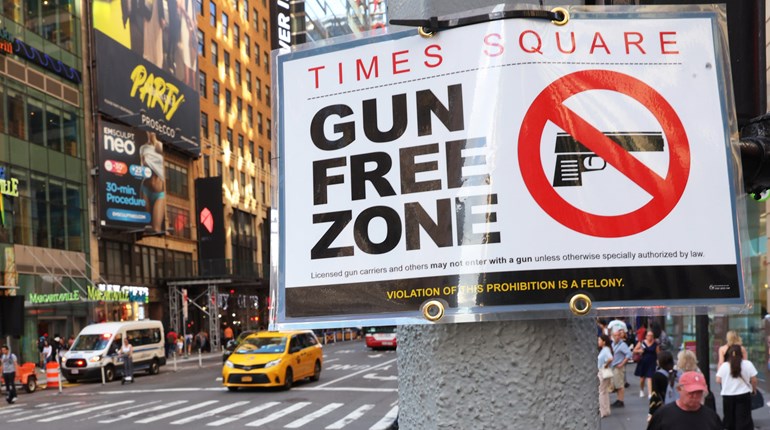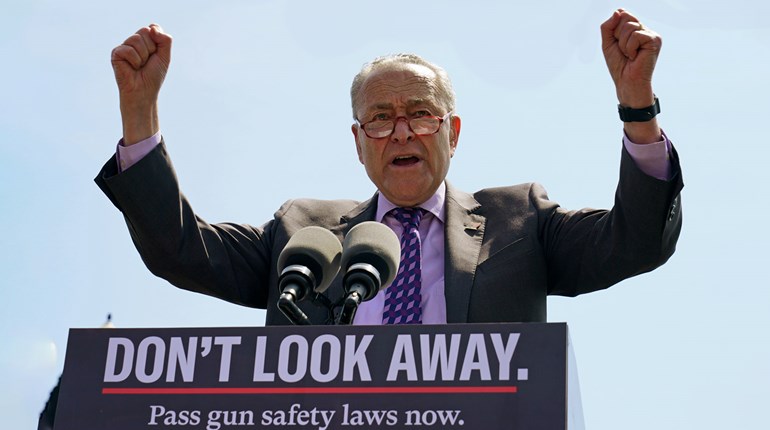
Crime rates have gone up in many areas of the country—especially for homicides—as the thin blue line is being stretched to near breaking in some cities. This has convinced more Americans to abandon the illusion that the police can always get there fast enough to save them from a violent criminal; as a result, more people are buying guns so they can protect themselves during the critical minutes it takes help to arrive.
New data indicates it is taking the police longer to arrive in many parts of the U.S. This increase even includes “Priority 1” calls to 911, which are usually defined as involving imminent peril.
The New York Police Department describes a “Critical Crime in Progress” as “Shots fired, assist police officer, robbery, burglary, larceny from person, assault w/knife, assault w/weapon, unusual incident.” The lesser category of “Serious Crime in Progress” is “auto theft, other larceny, other assault, roving band.” A “roving band” might be a group of looters destroying small businesses.
The New York City government’s NYC Analytics’ report on “911 End to End Detail” presents data from 2013 through August 2021 showing that, during these years, the average response time for a “Critical Crime in Progress” was 7.23 minutes (i.e., 7 minutes, 14 seconds); for a “Serious Crime in Progress,” the time was 9.5 minutes. These minutes are the time between when the phone rings at the 911 office to when the first police officer arrives at the scene.
During peak violent-crime periods, New York City’s average response time for a "Critical Crime in Progress" was 11.83 minutes.
Things have gotten worse in 2021. The report’s data ends in August 2021, but up to that point, the average response time has been 7.88 minutes for critical incidents and 10.92 for serious ones.
During peak violent-crime periods, the figures are worse. Consider the five weeks beginning on May 25, 2020. During this time, criminals all over America went on violent sprees. Many gangs looted and burned buildings. Other criminals—knowing the police were already overwhelmed—took advantage of the opportunity to perpetrate less-sensational violent crimes. During those five weeks, New York City’s average response time for a Critical Crime in Progress was 11.83 minutes. The time for a Serious Crime was the same.
Some cities are still reeling from the 2020 riots, and from the accompanying demonization, demoralization and defunding of their police by anti-gun politicians; for example, in Portland, Ore., writes investigative reporter Andy Ngo, before the riots began in May 2020, Portland’s “average response time for high-priority life and death emergency calls was around eight minutes. Now it takes 60% longer.”
Television station CBS 2 in Chicago used the state’s freedom of information act to obtain data on 911 calls over a two-year period. In the faster neighborhoods, the average police response time to a Priority 1 or Priority 2 call was a little under six minutes. In some other neighborhoods, over 8 minutes was usual.
These figures are no guarantee. Sometimes police come sooner, and sometimes later; for example, in Chicago this summer, CWB Chicago reported: “For more than 3 straight minutes Sunday morning, a Chicago police dispatcher read out dozens of 911 calls waiting to be assigned to police officers in their district—but no officers were available. A ‘shots fired’ call was 178 minutes old. A robbery was waiting for more than two hours. A domestic waiting for more than three hours. A 115-minute wait for a burglary.” Chicago Police Department Superintendent David Brown explained that slow 911 response times were “normal.” The Aug. 24, 2021, CWB Chicago web article included the scanner audio.
In our nation’s capital, notorious problems with 911 dispatch led to an outside audit. Studying 2019-20, the audit reported average dispatch times of about 120 seconds. But dispatch locations given to emergency responders were often vague or inaccurate. Companies like Uber or Domino’s Pizza can identify a cellphone’s location far more precisely than can the District of Columbia’s 911 system.
After the D.C. police are dispatched, how long does it take them to arrive at a Priority 1 scene? According to the Metropolitan Police Department’s Annual Report 2020, about 5 minutes and 33 seconds, which is a 19-second increase from 2019. So the total response time, from the first ring on the phone to the arrival of the police, is about 7.5 minutes.
Unlike many cities, San Francisco’s response time has dropped, according to the city controller’s annual Citywide Performance report. For Priority 1 calls, the median (half are less, half are more) time from the first ring of the phone to police arrival on the scene was 5.81 minutes for fiscal year 2020-21 (July 1 to June 30). That was better than fiscal year 2018-19, which was 7.3.
As the city data shows, in some cities, once you call 911 about a life-threatening criminal attack, the police will get there in under six minutes about half of the time. For some other cities, it will take several minutes longer. When the police are short-staffed, the wait can be hours.
Imagine if the 911 wait time was somehow reduced to four minutes nationwide. Even then, four minutes is a long time to wait when a violent criminal is breaking down your back door or attacking you in a parking lot.
During violent crimes, the victim’s survival often depends on how long it takes for the first armed responder to be at the scene—the police, obviously, can’t be everywhere all of the time. If the victim herself is armed, then the waiting time is zero. If the wait is a matter of minutes, the criminals have minutes to kill or severely injure victims.
No matter how long you wait for help to arrive, you can’t sue the government for failing to protect you. In the courts, the government has “sovereign immunity,” which means that the government can’t be sued unless a law authorizes suits in certain situations. No government has enacted a law allowing itself to be sued by ordinary unprotected crime victims.

































